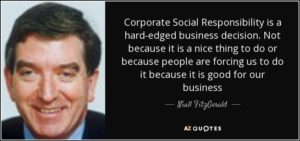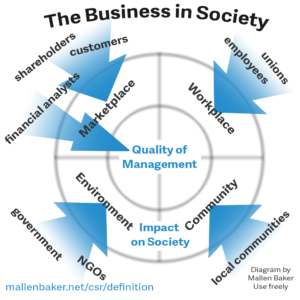
How ethics and social responsibility fundamentals for business?

How ethics and social responsibility fundamentals for business? Social responsibility for business is imperative for business in the long run with a vision on sustainability.

Ethics is not always black and white, and the ethical decision is not always clear to all. Even leaders can fail to act all the time ethically. It will cause a greater impact on the company’s reputation. It is one of the most critical assets, which is hard to rebuild once you lost it. If you are looking to start up a company that is ethically sound right from the ground up. Creating an ethical organisation will put you on the right path.

What are business ethics and social responsibility for business?

Business Ethics is a moral guideline. It is for the efficient running of the business based on what is right, wrong and fair. Most of employers rely on their own morals in making business decisions. They fall back upon their moral and religious backgrounds for guidance. However, they also get useful advice and information from their managers and immediate colleagues.
Employers may feel pressurised to behave unethically when seeking to make profits. Over recent years many firms and industries have strived to develop codes of conduct. It can be used to guide managers when making decisions.
The importance of business ethics to a firm
Working as an ethical company has many benefits. It can attract and keep investors, employees and customers. Let your investors know that your firm’s morals and promise to work ethically and responsibly. It provides them with peace of mind that their money is being used in a way that aligns with their moral standing. When working for a company with firm business ethics, employees are satisfied. They grasp that any of their action or inaction isn’t allowing any unethical practices to continue. Customers are at ease of buying products or services from your firm. They know how to source their materials and labour ethically and responsibly.
For example, a coffee-making company states all their raw beans are picked from sustainable plants. There is no deforestation has happened. People are getting paid a good living wage. In their area, investments have been made to ensure that producing coffee for a foreign market has not injured the local way of life. All these are the elements of their buying strategy. It becomes themselves a selling point for their final product.
A firm, which sets out to work within its own ethical guidelines is less at risk of being fined for poor behaviour. They will be less likely to find themselves in breach of one of the multitudes of laws concerning required behaviour. For example, there are laws around payments to corrupt regimes, or environmental practice policies. The whole company can get fined, and the directors can get penalised. The individual employees can be fined if the responsibility for an infraction falls on their shoulders.

How business ethics can cause a bad impact to the Wider World

Firms that are not following business ethics or ignoring their social responsibility drives to wider outcomes. The natural world can get affected by a lack of Business Ethics. For example,
- A firm which shows no care for where it disposes its waste products.
- A business which fails to take a long term view when buying up land for development.
- Or a company neglects its duties towards reducing its carbon footprint and advance green renewable energy.
They are damaging the world in which every human being lives. They are ruining the future prospects of all companies.
So, a business philosophy should stress the need for firms to behave as good corporate citizens. Instead of just obeying the law, every firm should conduct their production and marketing activities in the right manner. They should strictly avoid causing environmental pollution or exhausting finite world resources. Some companies have begun to behave in a more socially responsible way. It may partly because their managers want to do so. Or it may partly because of fear of environmentalist and consumer pressure groups and the media. They will also concern for their public image. It is argued that socially responsible behaviour can pay off in the long run, even if it involves some short-term sacrifice of profit.
Ethical practices can go beyond just ensuring your business does not harm people and the environment. It also means dedicating a share of your firm’s time and resources to actively updating these areas. For example,
- Investing in community programs,
- Investing in building in developing countries,
- Lobbying for political change,
- Supporting your employees to donate their time and expertise to other projects.
This level of business ethics is the most praiseworthy, which is something all companies strive for these days. It allows you to achieve higher standards for all in the future.




